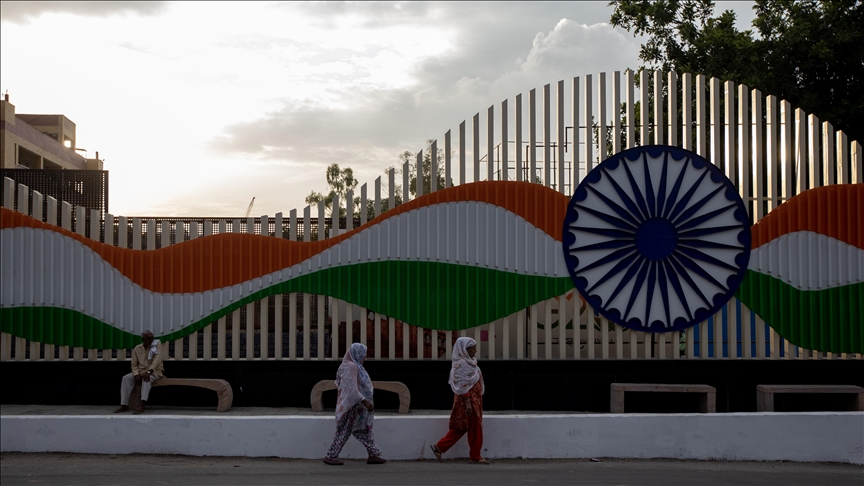ISTANBUL
The highly anticipated G-20 summit starting in India on Saturday could have an impact of immense magnitude on the existing world order, according to experts.
The gathering of leaders of the world’s wealthiest and most influential countries in the capital New Delhi is set to be a unique event due to several factors, including the absence of Chinese President Xi Jinping and Russia’s Vladimir Putin, the two major powers aligned against the West.
Then there is the fact that it is being hosted by India, a non-aligned rising power in Asia.
According to Husamettin Inac, a professor at the International Relations Department of Dumlupinar University in Türkiye, the summit is coming at a time when the US-led unipolar world order set after the World War II is no longer dominant.
“Nowadays, there are several countries standing against the neoliberal world order, such as Brazil, India, Mexico and others,” he told Anadolu.
He said the US is losing leverage and influence on all fronts, which in turn changes the nature of the G-20.
As an example, he cited efforts by countries to reject the US dollar, saying that the greenback’s supremacy “is in tatters.”
Praveen Donthi, a senior analyst at the International Crisis Group, believes the Russia-Ukraine war will “overshadow” the summit.
He said the conflict is “leading to a crisis of multilateralism in the global order today.”
“Because, I mean, it is directly the result of the conflict between the US-led West and the Russia-China bloc,” he added.
He said India’s aim is to try “to infuse some oxygen into multilateralism.”
“India is a rising middle power. It’s one of the fastest growing economies, and it is what you call a geopolitical swing state, which is trying to chart its own course and path, and trying to influence the regional order and global order at the same time,” he said.
Multipolar Asia, multipolar world
Inac said neoliberalism and “the West’s political economy and its institutions are losing their credibility,” while the dollar is losing its status as the global reserve currency.
One of the biggest threats is BRICS, the grouping of Brazil, Russia, India, China and South Africa, which has recently invited six more countries to join its ranks – Saudi Arabia, Iran, UAE, Argentina, Egypt and Ethiopia.
BRICS is also spearheading a charge to replace the dollar with its own common currency by 2030.
Just this week, Russia’s Ambassador to South Africa Ilya Rogachev presented a symbolic banknote of the BRICS currency to Mahash Saeed Alhameli, head of the UAE’s diplomatic mission.
How the Ukraine war pans out will be a major factor in how the world order looks in the future, he added.
“If Putin can cling to power against all odds, the global system will collapse and a new one will arise from its ashes, in which China will have a lot of power,” said Inac.
According to Donthi, that scenario is precisely what India wants to prevent.
“India does not want a unipolar Asia where China is dominant,” he said, adding that New Delhi will use the summit to flex its political muscles.
“It wants a multipolar Asia, which India says will lead to a multipolar world.”
India’s bilateral relationship with China “is also under severe stress right now because of the border crisis,” which could explain Xi’s decision to stay away from the summit, he said.
Moreover, New Delhi has been cozying up to Washington as exemplified by Prime Minister Narendra Modi’s June visit to the US.
“(President Joe) Biden’s arrival in New Delhi signals the coming together of India and the US in a big way,” said Donthi.
“Beijing is trying to send a signal that they’re not happy with the way things are panning out.”
However, he added that India is still “in a difficult position” as it tries to balance its ties with Russia and the West.
“At every UN resolution, India has abstained to condemn the invasion of Ukraine by Russia, because India has a deep strategic relationship that goes back a long way with Russia,” said Donthi.
“At the same time, India has been strengthening its relationship with the US and the West.”
‘Türkiye will find its rightful place’
About Türkiye’s role in the changing world order, Inac said the country “plays a big part in the economic model proposed by non-aligned countries, spearheaded by members of the BRICS alliance.”
Türkiye also plays a “huge role” in China’s Belt and Road Initiative, he added.
“This G-20 summit will also show how the US and EU approach their relations with Türkiye,” said Inac.
“New models of global integration will arise and Türkiye will find its rightful place in the new world order,” he concluded.

